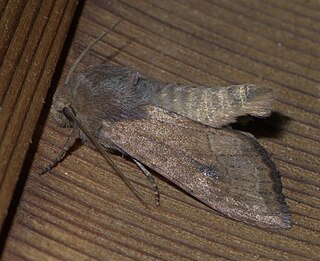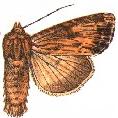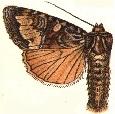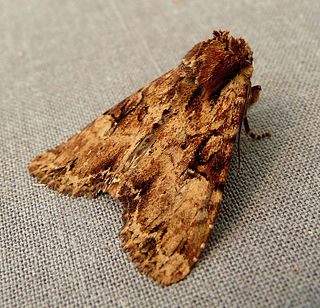
Apamea monoglypha, the dark arches, is a moth of the family Noctuidae. The species was first described by Johann Siegfried Hufnagel in 1766. It is a common, sometimes abundant, European species. It is found in most of Europe except northernmost Fennoscandia and the southern parts of the Iberian Peninsula and Greece. The species is also found in Anatolia, Turkestan, Western Asia and Central Asia, Siberia and Mongolia. In the Alps it is found up to heights of 2,500 meters. The smaller subspecies sardoa is found on Sardinia and Corsica.

Apamea remissa, the dusky brocade, is a species of moth of the family Noctuidae. It is distributed throughout Europe and Turkey, ranging across the Palearctic realm to Siberia, Manchuria and Japan. It has also been reported from Alaska.

Apamea sordens, the rustic shoulder-knot or bordered apamea, is a moth of the family Noctuidae. The species was first described by Johann Siegfried Hufnagel in 1766. It is distributed throughout Europe, east across the Palearctic to Central Asia and to China and Japan. It also occurs in North America.

Apamea is a genus of moths in the family Noctuidae first described by Ferdinand Ochsenheimer in 1816.

Apamea lithoxylaea, the light arches, is a moth of the family Noctuidae. The species was first described by Michael Denis and Ignaz Schiffermüller in 1775. It is distributed throughout Europe, the Caucasus, Armenia, Asia Minor and Turkey, and ranges east to the Altai Mountains.

Apamea ophiogramma, the double lobed, is a moth of the family Noctuidae. It is found in the Palearctic realm in North and Central Europe to the Urals, Turkestan, Russian Far East, and Siberia. There have been at least two separate introductions into North America and it is now rapidly expanding in range. This species is sometimes placed in the monotypic genus Lateroligia.

Apamea inficita, the lined Quaker is a moth of the family Noctuidae. The species was first described by Francis Walker in 1857. It is native to North America, where it can be found from Newfoundland west to British Columbia, north to the Yukon and the Northwest Territories, and south to Colorado.

Apamea lignicolora, the wood-coloured Quaker or wood-coloured apamea, is a moth of the family Noctuidae. The species was first described by Achille Guenée in 1852. It is native to North America, where it is distributed across much of Canada and the United States.

Apamea occidens, the western apamea, is a moth of the family Noctuidae. The species was first described by Augustus Radcliffe Grote in 1878. It is native to western North America as far east as Alberta and Kansas.

Apamea plutonia, the dusky Quaker or dusky apamea, is a moth of the family Noctuidae. The species was first described by Augustus Radcliffe Grote in 1883. It is native to northern North America, where it occurs across the boreal regions, with some occurrences from as far south as New Mexico and Pennsylvania.

Apamea vultuosa, the airy apamea, is a moth of the family Noctuidae native to North America.

Apamea cariosa, commonly called the nondescript dagger moth, is a moth of the family Noctuidae. It is found in the northeastern United States, including New York, Maryland, Indiana and Virginia. In Canada it is found in Ontario, Quebec, New Brunswick, Alberta, and Manitoba.

Apamea zeta is a moth of the family Noctuidae. It has a Holarctic distribution, and can be found throughout the Northern Hemisphere. It occurs throughout Europe and the northern half of North America.

Apamea rubrirena is a moth of the family Noctuidae.

Amphipoea lucens, the large ear or large ear moth, is a moth of the family Noctuidae and is found in most of Europe. It was first described, in 1845, by the German entomologist, Christian Friedrich Freyer, from a specimen, found in Berlin. The larvae feed on the roots and stems of grasses.

Apamea sublustris, the reddish light arches, is a moth of the family Noctuidae. The species was first described by Eugenius Johann Christoph Esper in 1788. It is found in central and southern Europe, Turkey and the Caucasus.

Apamea furva, the confused, is a moth of the family Noctuidae. The species was first described by Michael Denis and Ignaz Schiffermüller in 1775. It is found throughout Europe. In southwestern Europe it is primarily montane. It is found as far north as the Arctic Circle. From Europe its range extends to Siberia, Turkey, Iran, Kyrgyzstan, Mongolia and Xinjiang in China.

Apamea epomidion, the clouded brindle, is a moth of the family Noctuidae, sub-family Hadeninae. The species was first described by Adrian Hardy Haworth in 1809. It is found throughout continental Europe, the British Isles, Sweden and Central Asia. It is also found in the Altai Mountains, west Siberia, and in Amur.

Apamea aquila is a species of moth belonging to the family Noctuidae.














